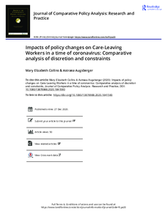This page contains documents and other resources related to children's care in the Americas. Browse resources by region, country, or category.
Displaying 601 - 610 of 3180
"Experts and state agencies say families are reluctant to take in foster children for fear of spreading Covid-19," says this article from NBC News.
This study analyzed three open-ended responses from a national online survey examining compassion fatigue in Children’s Advocacy Centers (CACs) to understand the impact of work-related stress on child welfare workers (CWWs).
This policy analysis examines the impact of COVID-19 policy guidance on the role of workers who provide outreach to transition-age care leavers.
This study investigates the extent and causes of child abandonment and various practices and services in relation to prevention of child abandonment in Denmark and other high-income countries.
El objetivo de esta contratación de un consultor/a es apoyar el Programa de Protección de UNICEF México en la implementación y seguimiento de las estrategias y acciones de cooperación en materia de cuidados alternativos para niños, niñas y adolescentes privados del cuidado familiar o en riesgo de perderlo, en coordinación con las autoridades nacionales y locales y otros actores relevantes.
The Adoption of Children (Amendment) Bill has been presented to Guyana's National Assembly of the Twelfth Parliament, according to this article from iNews Guyana.
This article describes the benefits of monthly family team meetings for parents involved with child welfare. Findings are shared from semi‐structured, qualitative interviews conducted with 17 parents whose children had been placed in substitute care.
"Outside of the traditional foster care system exists a shadow system of potentially hundreds of thousands of children removed by CPS to their relatives or family friends—without a court case, monetary support, or due process," says this article from the Appeal which explores the phenomenon of "shadow foster care" in the U.S.
This article from USA Today shares the stories of international adoptees in the United States who grew up believing they were U.S. citizens, only to find that international adoption does not guarantee citizenship.
This webinar sheds light on the often under-the-radar work and impact of more than 3,000 Family Resource Centers in the U.S.


